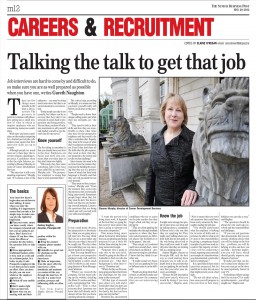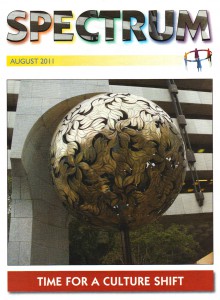The two sides to recruitment
 The Sunday Business Post Article – Gareth Naughton May 2013
The Sunday Business Post Article – Gareth Naughton May 2013
After a tough few years, recruitment agencies are reporting a pick-up in business as competition for good quality candidates intensifies. Given their crucial role as a conduit… click here to read the full articles
Talking the talk to get that job
 The Sunday Business Post Article – Gareth Naughton (May 2012)
The Sunday Business Post Article – Gareth Naughton (May 2012)
Job interviews are hard to come by and difficult to do, so make sure you are as well prepared as possible when you have one… click here to read the full article
Eight simple steps to a new career direction
Spectrum Magazine (published by IBOA) – Eleanor Murphy (August 2011)
In a very short space of time, a career in banking has changed from being a secure ‘job for life’ to one of uncertainty and doubt. More and more, I meet bank officials who have already been made redundant – or others who feel that this might be an appropriate time to explore other avenues – and perhaps enjoy greater security in the process.
The trauma of losing a job or even the prospect of possible job loss – is devastating. Feelings of despair, helplessness and grief are understandable – perhaps even anger, embarrassment and fear. And in this spiral of anxiety and depression, contemplating future employment is virtually impossible.
If you find yourself in this position, you have two choices. You can sit back, do nothing and remain negative. Or sit up, be proactive and fight back. It’s your call. Your future starts here – today. It’s time to change your thinking. Here’s a challenging thought for you. Opportunity for reflection Could you regard redundancy as a potential gift rather than as a heartbreak?
Could this be the chance to take a good hard look at yourself and ask if you’ve truly been working in a job that has best suited you, or that has used your talents and skills to the best effect?
Most of us can get so focused on the day-to-day routine of doing our job to the best of our
ability that we fail to take the time to ask ourselves these big, important questions.
Here are eight simple steps that you can take to help you write the next exciting chapter in your career story. If you feel overwhelmed by all this, but still have the fire in your heart, then seek professional assistance.
Maybe some guidance or a sense of direction is all you need? Or perhaps you may need more
in-depth analysis of your core skills and abilities. A final thought is that you contact a coach or mentor to advise you on how best to nurture your career quest.
But whatever course of action you plan to take, make it sooner rather than later. Better
still, make it today!
1) Harness positivity and increase your productivity.
Manage your job loss in a systematic way. It will increase your chances of embarking on a successful career change.
2) Get rid of any negative thoughts that will drag you down.
They will only become embedded in your subconscious and undermine your confidence.
Instead, adopt a good, positive mental attitude which is the key to future career success.
3) Know yourself.
Know your core strengths, your abilities, your skills, your values, your interests, etc. By looking at your strengths, your values and your past successes, you will begin to feel more positive.
4) Have a vision.
Dream your ideal job. What would you really love to do? Be as imaginative as you want, but keep your
strengths, your values, your interests and your skills in focus. Maybe you have hidden talents. What kind of work environment suits you – working outdoors, working on your own, meeting new people?
5) Devise an action plan.
See where it is that you would love to be in one, two or five years’ time – even right up to retirement.
Build a bridge between where you are now and where you want to be. Have you the necessary skills, the competencies, the right attitude? Do you need to get your CV in order? Who will give you that information? Could you do voluntary work in a similar environment? Could you work from home?
Do you need computer skills? The questions are quite numerous – but must be addressed.
6) Get informed.
Change always seems scarier when you have either inadequate – or worse – inaccurate information.
Research the internet, go to the local library, join relevant bodies – especially the ones that engage your interests. Talk to people who have started similar jobs or businesses, trained on similar courses, etc. Read relevant articles, publications, etc. The more informed you are, the more solid your bridge.
7) Take advantage of all training and educational opportunities.
Consider online courses. Maybe a degree was always on your radar but you never had the chance to consider it further. Ensure that the courses are right for you, at the right level, and form part of your building blocks to your future career success. Also, consider informal ways of educating yourself
by, for example, joining professional bodies, attending workshops and keeping up with trade publications in your field.
8) Update your CV, polish your interviewing skills and ensure you network.
Networking is a great way of finding out what jobs are out there that may not necessarily be publicly
advertised, and you’ll need to have your CV and interview skills up to scratch if the chance arises.
You also may need to consider taking an interim job, like temporary work or consulting, or just a simple job to pay the bills while you are developing your new career path.
Discovering the Value of psychometric testing
Sunday Business Post – Linday Daly (June 2011)
Psychometric testing can provide a more accurate prediction of a candidate’s suitability for a particular role. That is according to Eleanor Murphy, managing director of Career Development Services.
“Research has shown this method is far more reliable than an interview, for example”, said Murphy. In agreement, it would seem, is the National Asset Management Agency (Nama), which recently confirmed that it was using psychometric assessment to help fill 28 new positions.
Nama is not unique in this. SHL Group specialises in aptitude and personality test for the workplace. A report it released last month on global assessment trends found that, of the 463 HR professionals it surveyed worldwide, 85% used tests as part of the hiring process.
Such tests can assess cognitive ability and personality. There are also job-specific tests, which can be used to appraise a candidate’s knowledge and their suitability for a particular job. The most common ability tests rate numerical and verbal reasoning abilities.
Personality questionnaires are also popular as a means to determine a candidate’s preferred behavioural style and how suitable they are to a specific work culture.
What is it?
A psychometric test is an on-line or paper-based assessment, which is used to determine a person’s abilities in the workplace.
These tests are usually presented in multiple-choice format. The traits or aptitudes that are used include knowledge, abilities, skills and personality.
Common examples of psychometric tests would be emotional or personality profiles and intellectual assessments.
Ethical Standards.
Audrey Hughes, managing director of Principle HR, uses ability and personality tests to help her clients to hire new staff. In all, she has access to 1,000 separate online assessments.
“We choose the most appropriate one for the client and the role, and often do it in conjunction with the hiring manager”, she said.
A member of the British Psychological Society, Hughes said it was important that psychometric tests were administered by qualified professionals, who could assess and interpret the results.
In April 2006, the Psychological Society of Ireland published its own policy on the use of psychometric tests in Ireland. This called for tests to be used “appropriately, professionally and in an ethical manner”.
Michael McDonnell, director of the Chartered Institute of Personnel and Developments Ireland, advised firms to use reputable tests and assessors. The most reliable psychometric tests are typically designed by occupational psychologists. “It’s very easy now to download something from the web. We would caution very much against that type of approach, because while anyone can administer these profiles, it really does take a skilled person to assess the results,” he said.
Preparing to test.
Before companies opt to use psychometric testing as part of the recruitment process, McDonnell advised them to carefully consider their reasons for doing so. Ask yourself, ”will the use of psychometric tests add value to the recruitment process? Do you have the resources needed to carry out psychometric testing effectively? Is the test relevant to the job specification? Consider also the stage at which the tests will be incorporated into the recruitment process.”
It would be time-wasting and non-beneficial to carry out psychometric testing on all candidates. The test shouldn’t be used on their own, but in conjunction with competency-based –based interviews, reference checks and on-the-job assessment”, says Hughes. While psychometric testing can be used to help fill positions at all levels-and within all functions-of an organisation, Hughes said it was generally more beneficial at mid-to-senior level.
Cost and value
“The cost of psychometric testing varies widely. A basic test can be had for as little as €100. According to Murphy, however, you could expect to pay up to €500 for an all-in-one package, which could be used to test core behaviours and aptitudes, provide feedback to employers and candidates. Companies can measure the return on their investment in psychometric testing by assessing the performance of the candidates they have recruited, along with their attrition rates. When psychometric tests are used properly, you should be able to predict job performance and working style”.


